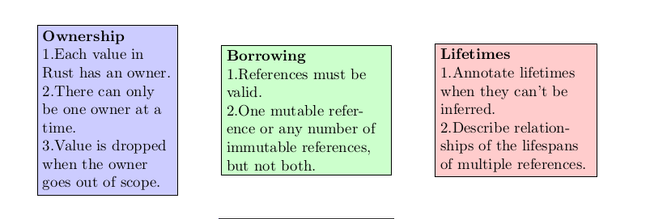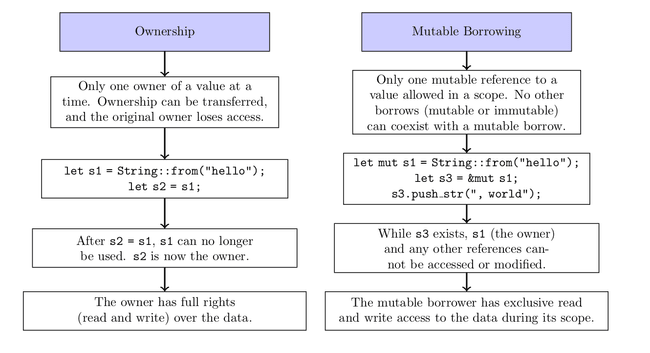Ownership Borrowing and Lifetimes in Rust
Rust has a set of rules that governs how Rust manages memory . Each value has a single owner responsible for its...

Ownership, Borrowing, and Lifetimes in Rust :🔗

| Concept | Description | Example Usage | When Not to Use | Common Problems | Solutions |
|---|---|---|---|---|---|
| Ownership | A set of rules that governs how Rust manages memory. Each value has a single owner, responsible for its lifecycle. | let s1 = String::from("hello"); |
When you need shared access to data. | - Trying to use a value after it has been moved. - Memory leaks. |
- Use borrowing when data needs to be accessed by multiple parts. - Utilize clone() if you need to keep a copy of the data. |
| Borrowing | Refers to accessing data without taking ownership. It can be immutable (&T) or mutable (&mut T). |
Immutable: let len = calculate_length(&s1);Mutable: let s = &mut String::from("hello"); |
When you need ownership for long-term use of data. | - Simultaneous mutable and immutable borrows. - Dangling references. |
- Ensure mutable references are not mixed with immutable ones. - Use scopes to limit the lifetime of borrows. |
| Lifetimes | Describes the scope for which a reference is valid. Used to prevent dangling references. | fn longest<'a>(x: &'a str, y: &'a str) -> &'a str |
When dealing with data that doesn’t involve references. | - References that may outlive the data they point to. | - Explicitly annotate lifetimes to clarify the relationships between references. - Use generic lifetimes for flexibility. |
Ownership🔗
- Usage: When a variable needs complete control over a value.
- Problem: Using a value after transferring its ownership (
let s2 = s1; println!("{}", s1);). - Solution: Use borrowing for temporary access or
clone()for creating a full copy.
Borrowing🔗
- Usage: To read (
&T) or modify (&mut T) data while letting the owner retain ownership. - Problem: Mutating data while it's immutably borrowed elsewhere leads to compilation errors.
- Solution: Structure code to avoid simultaneous mutable and immutable borrows.
Lifetimes🔗
- Usage: To ensure references are valid as long as needed but no longer.
- Problem: A reference is used after the data it points to has been freed.
- Solution: Define lifetimes to express the relationships and constraints between different references and data.
Ownership and Mutable Borrowing in Rust:🔗

Table explaining the concepts of Ownership and Mutable Borrowing in Rust🔗
| Concept | Description | Example | Clarification | Notes |
|---|---|---|---|---|
| Ownership | Only one owner of a value at a time. Ownership can be transferred, and the original owner loses access. | let s1 = String::from("hello");let s2 = s1; |
After s2 = s1, s1 can no longer be used. s2 is now the owner. |
The owner has full rights (read and write) over the data. |
| Mutable Borrowing | Only one mutable reference to a value allowed in a scope. No other borrows (mutable or immutable) can coexist with a mutable borrow. | let mut s1 = String::from("hello");let s3 = &mut s1;s3.push_str(", world"); |
While s3 exists, s1 (the owner) and any other references cannot be accessed or modified. |
The mutable borrower has exclusive read and write access to the data during its scope. |
Additional Notes:🔗
-
Ownership Transfer: Ensures memory safety by preventing accidental data duplication and invalid memory references. Only the current owner can interact with the data.
-
Mutable Borrowing: Enforces at most one writer to prevent data races. The owner relinquishes temporary control over the data for the duration of the mutable borrow.
Table explaining the concepts of Ownership, Immutable Borrowing, and Mutable Borrowing in Rust:🔗
| Concept | Description | Example | Notes |
|---|---|---|---|
| Ownership | A variable has full control and responsibility over its data. Only one owner at a time. | let s1 = String::from("hello"); |
- s1 has full ownership.- When s1 goes out of scope, its data is automatically deallocated. |
Immutable Borrowing (&T) |
Allows read-only access to data. Multiple immutable borrows can coexist. | let s2 = &s1;println!("{}", s2); |
- Data can be read but not modified. - s1 remains accessible and its data cannot be changed while s2 exists. |
Mutable Borrowing (&mut T) |
Allows read and write access to data. Only one mutable borrow allowed in a scope, with no other borrows (mutable or immutable). | let mut s1 = String::from("hello");let s2 = &mut s1;s2.push_str(", world"); |
- Data can be modified. - s1 cannot be used or borrowed again until s2's scope ends. |
Additional Notes:🔗
-
Ownership Transfer: When a variable's ownership is transferred (moved), the original variable cannot be used afterward. This prevents double frees and memory safety issues.
- Example:
let s3 = s1;After this,s1can no longer be used.
- Example:
-
Lifetime Annotations: When dealing with references in functions, lifetimes are used to ensure that the data a reference points to is not deallocated while the reference is still in use.
- Example:
fn borrow_string(s: &String) { ... }Here, Rust infers the lifetime to ensuresis valid for the duration of the function.
- Example:
-
Concurrency Implications: Rust's ownership and borrowing rules significantly reduce concurrency issues like data races, as they enforce strict access patterns to shared data.
COMING SOON ! ! !
Till Then, you can Subscribe to Us.
Get the latest updates, exclusive content and special offers delivered directly to your mailbox. Subscribe now!